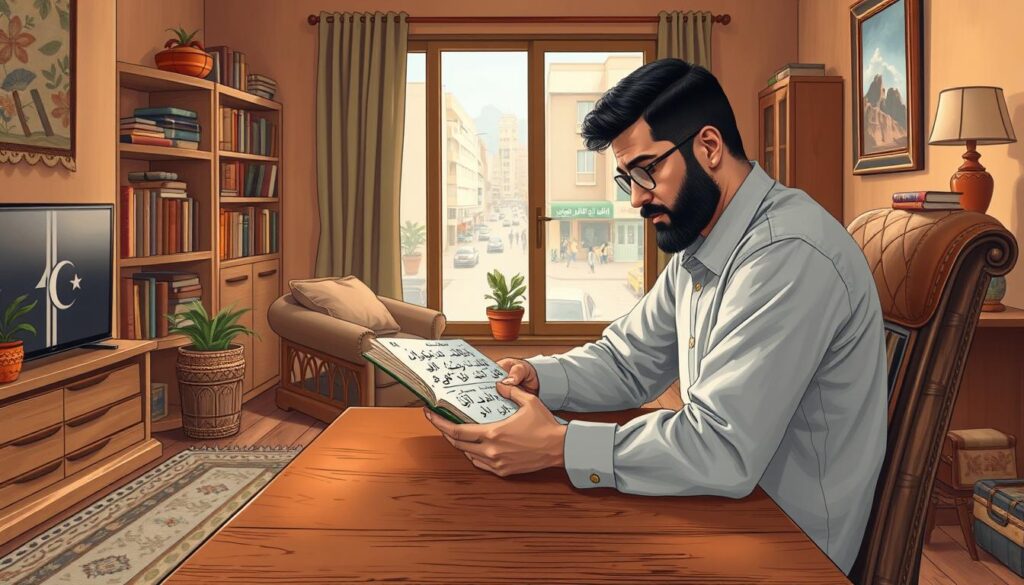Exploring Libya’s rich culture reveals the unique Libyan dialect. This form of Arabic has a long history. Learning Libyan Arabic phrases is rewarding.
It’s a valuable skill for connecting with locals and enjoying the vibrant culture.
Libya’s youth make up 65% of its population. This diversity enriches the cultural landscape. Learning the Libyan dialect deepens your understanding of history, customs, and traditions.
Whether for travel, work, or personal growth, the Libyan dialect is worth exploring.
Introduction to the Libyan Dialect
The Libyan dialect is a unique and expressive form of Arabic. It’s deeply rooted in Libyan culture. Learning it reveals the language’s many nuances and variations.
Table of Contents
What is the Libyan Dialect?
The Libyan dialect, also known as Libyan Arabic, is a special form of Arabic spoken in Libya. It has its own grammar, vocabulary, and pronunciation. This makes it different from other Arabic forms. You can learn more about it on the Libyan Arabic Wikipedia page.
Libyan Arabic words are shaped by languages like Italian, Turkish, and Berber. It’s the main language for daily talks, writing, and media in Libya. The Libyan dialect is key to Libyan culture and identity. It shows national pride and brings people together.
- Unique pronunciation and intonation
- Distinct grammar and sentence structure
- Influence from other languages, such as Italian and Turkish
The Libyan dialect is a rich and complex language. It’s essential to Libyan culture and identity. Understanding and valuing the Libyan dialect helps us see Libya’s history and traditions more clearly.
Unique Features of the Libyan Dialect
Exploring North African Arabic, you’ll find the Libyan dialect stands out. It has its own way of speaking Arabic. To learn it, you need to know how it sounds different.
The “q” sound is like a “g” in Libyan Arabic. This makes it sound unique.
Libyan Arabic phrases follow a subject-verb-object order. This is similar to other Arabic forms. But, its grammar and syntax are special. It uses suffixes and prefixes to show how words relate to each other.
- Phonetic characteristics: distinct pronunciation of certain sounds
- Syntax and grammar: subject-verb-object word order with a system of suffixes and prefixes
- Vocabulary: unique words and expressions that are not found in other forms of Arabic
Studying these features will help you master the Libyan dialect. It’s key to understanding North African Arabic. Whether for personal or professional reasons, knowing the dialect’s special traits is important.
Differences Between Libyan Arabic and Other Dialects
Exploring Arabic dialects, you’ll see Libyan Arabic stands out. Its vocabulary, grammar, and pronunciation are unique. These reflect Libya’s history and culture. When comparing it to Egyptian and Levantine Arabic, each dialect has its own traits.
The Libyan dialect is shaped by Libya’s location and cultural exchanges. It has been influenced by Italian and Berber languages. This gives Libyan Arabic a special flavor. Egyptian Arabic, on the other hand, is shaped by media and entertainment, making it known across the Arab world.
Some key differences between Libyan Arabic and other dialects include:
- Vocabulary: Libyan Arabic has unique words and expressions not found elsewhere.
- Grammar: Its grammar and sentence structure differ from Egyptian and Levantine Arabic.
- Pronunciation: Libyan Arabic’s pronunciation is distinct, with special sounds and intonation.
Understanding these differences is key for effective communication with Libyan Arabic speakers. Recognizing Libyan dialect’s unique features helps appreciate Arabic’s richness and diversity. It also improves your language skills.
Importance of the Libyan Dialect in Culture
The Libyan dialect is key to Libyan culture, more than just talking. It shows Libyan identity and shares feelings and values. Learning it helps you understand the culture and its people better.
In books and poems, the Libyan dialect highlights the culture’s beauty. Libyan writers and poets use it to share their thoughts and feelings. This makes their work more real and touching. Traditional folk songs and poems often use Libyan Arabic phrases.
In music and stories, the Libyan dialect keeps the culture alive. Traditional music and stories use the dialect. This helps pass down traditions and values. Learning the dialect lets you appreciate these traditions and connect with Libyans deeply.
Some key parts of Libyan culture influenced by the dialect are:
- Literary works, such as novels and poetry
- Traditional music and folk songs
- Oral traditions, including storytelling and proverbs
The Libyan dialect is vital to Libyan culture. Understanding it gives you a deeper look into the country’s rich heritage. It also helps you connect with Libyans in a meaningful way.
Influence of Other Languages on the Libyan Dialect
The Libyan dialect has been shaped by various languages, including Berber and Italian. These languages have added to its unique character. This is why the Libyan Arabic vocabulary has been influenced by them, mainly in technology and modernization.
For example, the Libyan dialect has taken words and phrases from Italian. This shows the country’s historical ties with Italy.
In North African Arabic, the Libyan dialect stands out. It has been shaped by different languages and cultures. The country’s location has made it a hub for exchanging ideas and languages.
This has made the Spoken Arabic in Libya both familiar and unique. It’s different from other Arabic dialects in the region.
Some key features of the Libyan dialect include:
* Borrowed words and phrases from Italian and other languages
* Unique pronunciation and intonation patterns
* Distinct grammatical structures and vocabulary
These features show Libya’s complex history and cultural diversity. Understanding the influence of other languages helps us appreciate Libya’s rich cultural heritage. It also highlights the role of language in shaping identity and community.
Learning the Libyan Dialect
Starting your journey to Learn Libyan Dialect opens up a world of resources. You’ll find tools for reading, writing, and speaking Libyan. With North African Arabic growing in importance, knowing the language is key. Online courses and apps offer interactive lessons. Books and literature dive deep into the language and culture.

Begin by checking out online courses on Libyan Arabic phrases and grammar. They’re designed for all levels, from beginners to advanced learners. Language learning apps also have a lot to offer, like audio and video lessons, flashcards, and interactive exercises.
For better practice, try language exchange programs. They connect you with native speakers for feedback. You can also join language learning communities on social media. Here, you can share tips and resources with others. Using these resources will boost your skills in Libyan dialect and deepen your understanding of North African Arabic culture.
Common Phrases in the Libyan Dialect
Exploring the Libyan dialect, you’ll see how important everyday greetings are. These phrases are key in Spoken Arabic in Libya. They show the country’s unique cultural heritage. The Libyan dialect mixes Arabic, Italian, and other languages.
In Libyan Arabic, saying hello is a big part of talking to others. Start with “as-salamu alaykum” (peace be upon you) or “marhaba” (hello). To ask how someone is, say “kayf al-hal” (how are you?). These phrases show respect and hospitality, values in Libyan culture.
For starting conversations, Libyan Arabic has many options. You can talk about food, family, or daily life. Use phrases like “kayf al-akhbar” (what’s new?) or “ma’a as-salaama” (go with peace). The Libyan Arabic vocabulary is rich, showing the country’s history and cultural exchange.
To get better at Libyan Arabic, learn these common phrases and practice them. Use online resources, language exchange programs, or talk with native speakers. The best way to learn any dialect is to dive into its culture and words.
Challenges of Learning the Libyan Dialect
Learning the Libyan Dialect can be tough, mainly for those who aren’t native speakers. One big issue is the unique way some sounds are pronounced. For example, the “q” sound is like a “g” in Libyan Arabic. This makes it hard to get the Libyan Arabic phrases right.
Another problem is the lack of standard rules in the Libyan Dialect. This makes it hard to find good learning materials. To learn Libyan Dialect well, you need to find trusted sources that teach the language fully.
Some of the challenges of learning the Libyan Dialect include:
- Unique pronunciation issues, such as the “q” sound
- Lack of standardization in language learning materials
- Limited availability of resources for learning Libyan Arabic phrases
Even with these challenges, learning the Libyan Dialect can be very rewarding. With the right tools and effort, anyone can learn the Libyan Dialect. This will help them understand Libyan Arabic phrases better.
The Role of the Libyan Dialect in Identity and Community
Exploring the Libyan dialect reveals its key role in shaping identity and community. Libyan Arabic vocabulary is essential, fostering national pride and social unity. Spoken Arabic in Libya symbolizes Libyan culture and heritage.
The book “Identity and Dialect Performance” explores the complex link between identity and dialects. It shows how dialects shape national identity, covering 388 pages with contributions from various authors. For more insights, visit this resource on Arabic dialects.
The Libyan dialect is vital in social and cultural events like weddings and festivals. It connects people with the same language and heritage, fostering a sense of community. A study in this article highlights its role in shaping Libyan identity and community.

In conclusion, the Libyan dialect is more than just a language. It’s a cornerstone of Libyan identity and community. Understanding its role in national pride and social cohesion deepens our appreciation for Libyan culture and heritage.
How Technology is Shaping the Libyan Dialect
When you dive into the Libyan dialect, you might ask how tech is changing it. Social media and trends in communication are big players here. Online, North African Arabic dialects, like Libyan Arabic, get more attention than ever.
For those eager to Learn Libyan Dialect, tech offers many tools. You can find online courses, language apps, and social media groups focused on the language. These tools help you meet native speakers, improve your skills, and pick up new Libyan Arabic phrases.
Technology’s influence on the Libyan dialect includes:
- More visibility and promotion of the language on social media
- Access to language learning resources and courses
- Chances to practice with native speakers
In summary, tech is deeply influencing the Libyan dialect. Its role will likely grow even more. As you keep exploring, you’ll see tech’s role in promoting and keeping North African Arabic dialects alive.
The Future of the Libyan Dialect
Thinking about the future of the Libyan dialect is important. Globalization is changing how Dialects in Libya are used. English and French are becoming more common, which might reduce Spoken Arabic in Libya. But, it’s key to keep the Libyan dialect alive, mainly among the young.
The Libyan Arabic vocabulary is full of life, showing Libya’s history and culture. To keep the dialect alive, we need to support language and cultural programs. These programs highlight the dialect’s importance.
- Language education policies and programs
- Cultural exchange and preservation initiatives
- The role of technology in promoting the Libyan dialect
Understanding these factors helps us see the challenges and chances for the Libyan dialect. This knowledge is essential for its future.
Conclusion
The Libyan arabic is a special part of Libyan culture. It’s worth celebrating and keeping alive. By learning the Libyan dialect, you can connect with people and their heritage. You also help protect this valuable language.
The Libyan Arabic phrases we’ve looked at show the beauty of Libyan language. You might find the greetings, colloquialisms, or syntax interesting. Each part helps us understand and connect with others better.
We suggest you keep exploring the Libyan arabic. Try language classes, read books, and talk to locals. This way, you’ll learn more and help keep this unique language alive for future generations.
Source Links
- Libya: Peacebuilding versus Youth – Libya – https://reliefweb.int/report/libya/libya-peacebuilding-versus-youth
- I’m a ‘danger tourist’ — I was held at gunpoint in Libya and would do it again – https://nypost.com/2024/08/28/lifestyle/im-a-danger-tourist-i-was-held-at-gunpoint-in-libya-and-would-do-it-again/
- Exploring the Rich Libyan Culture: Traditions, History, and Vibrant Heritage | Qabas | Consulting & Training – https://qbs.ly/insights/libyan-culture/
- Libya Languages – https://www.familysearch.org/en/wiki/Libya_Languages
- what language is spoken in libya – https://www.vodaswim.com.tw/intipya/what-language-is-spoken-in-libya?srsltid=AfmBOoo8AVslXg2fs8me9vkyUP1XRMBQlq6x9j8NmTtb07bGx-qWCi51
- 10 interesting fun facts about Libya — Young Pioneer Tours – https://www.youngpioneertours.com/10-interesting-fun-facts-about-libya/
- Libya Fun Facts for Kids – https://www.worldcountriesforkids.com/libya/
- Learn Arabic with Facebook: A conversation with the ICLS Teacher – https://www.icls.edu/blog/a-conversation-with-slima-shahati-on-teaching-libyan-arabic-with-facebook
- Arabic Dialects: An Overview of Regional Variations – Arabic Blog – https://earabiclearning.com/blog/2024/09/arabic-dialects-an-overview-of-regional-variations-2/
- Human rights in Libya – https://www.amnesty.org/en/location/middle-east-and-north-africa/north-africa/libya/report-libya/
- No title found – https://oxfordre.com/africanhistory/display/10.1093/acrefore/9780190277734.001.0001/acrefore-9780190277734-e-533
- PDF – https://ijlls.org/index.php/ijlls/article/download/1904/777/8045
- Culture of Libya – https://en.wikipedia.org/wiki/Culture_of_Libya
- Arabic language test to become requirement for postgraduates – https://www.universityworldnews.com/post.php?story=20240806100501524
- List of Libyan Arabic words of Italian origin – https://en.wikipedia.org/wiki/List_of_Libyan_Arabic_words_of_Italian_origin
- Libya – Wiktionary, the free dictionary – https://en.wiktionary.org/wiki/Libya
- The Second Italo-Senussi War and the Great Pacification of Libya — Libyan Heritage House – https://libyanheritagehouse.org/the-second-italo-senussi-war-1923-1932
- Secret Language as a “Weapon of Defense”: The Problem of Opacity in Italian Colonial Libya | Signs and Society | Cambridge Core – https://www.cambridge.org/core/journals/signs-and-society/article/secret-language-as-a-weapon-of-defense-the-problem-of-opacity-in-italian-colonial-libya/A95EDE95B64F0642590A0F5E93C8D4AD
- Identity and Dialect Performance: A Study of Communities and Dialects – https://www.routledge.com/Identity-and-Dialect-Performance-A-Study-of-Communities-and-Dialects/Bassiouney/p/book/9781138241787?srsltid=AfmBOoopye-eNwRG-F-I10v00ceDyJzOr7_JJnJRFNZvSwwR4spd2kXa
- Grounds for Change: Libyan Coffee Culture and Its Role Within Libya’s Socio-Political Development — FOREIGN AFFAIRS REVIEW – https://www.foreignaffairsreview.com/home/grounds-for-change-libyan-coffee-culture-and-its-role-within-libyas-socio-political-development
- ‘Fragile stability’ in Libya increasingly at risk, Security Council hears – https://news.un.org/en/story/2025/02/1160281
- Libya – https://en.wikipedia.org/wiki/Libya
- “Fragile stability in Libya is increasingly at risk,” USG DiCarlo tells Security Council – https://dppa.un.org/en/mtg-sc-9862-usg-dicarlo-libya-19-feb-2025
- Chief of Defence Staff Portolano’s lightning visit to Libya – Agenzia Nova – https://www.agenzianova.com/en/news/Portolano’s-Chief-of-Defense-Staff’s-lightning-visit-to-Libya/
- How to Say ‘Dad’ in Arabic – https://earabic.io/blog/how-to-say-dad-in-arabic

